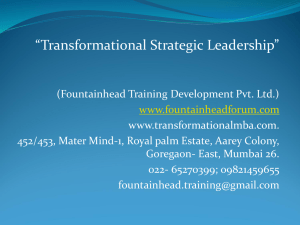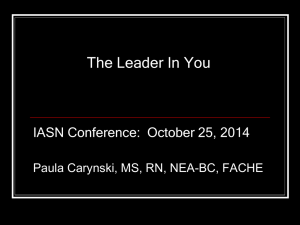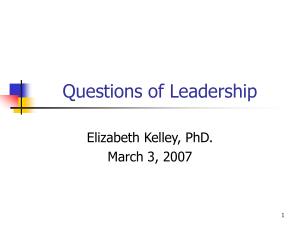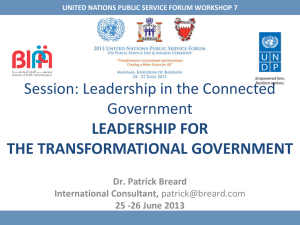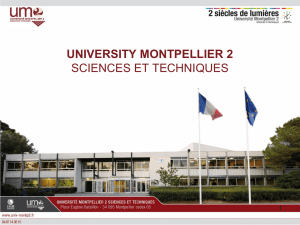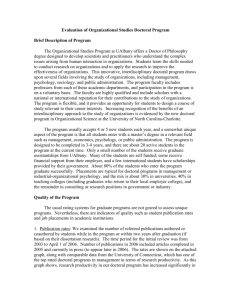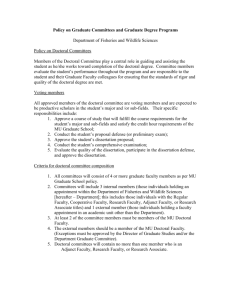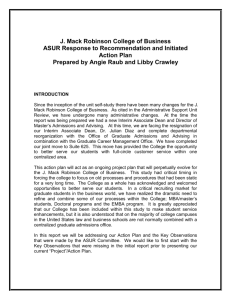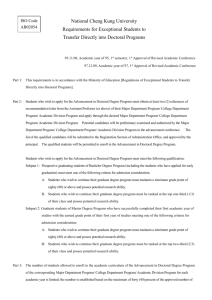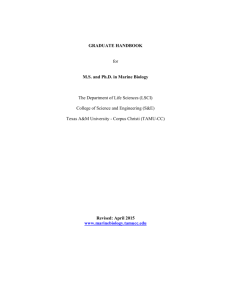Building New Leadership for School Improvement and Reform
advertisement
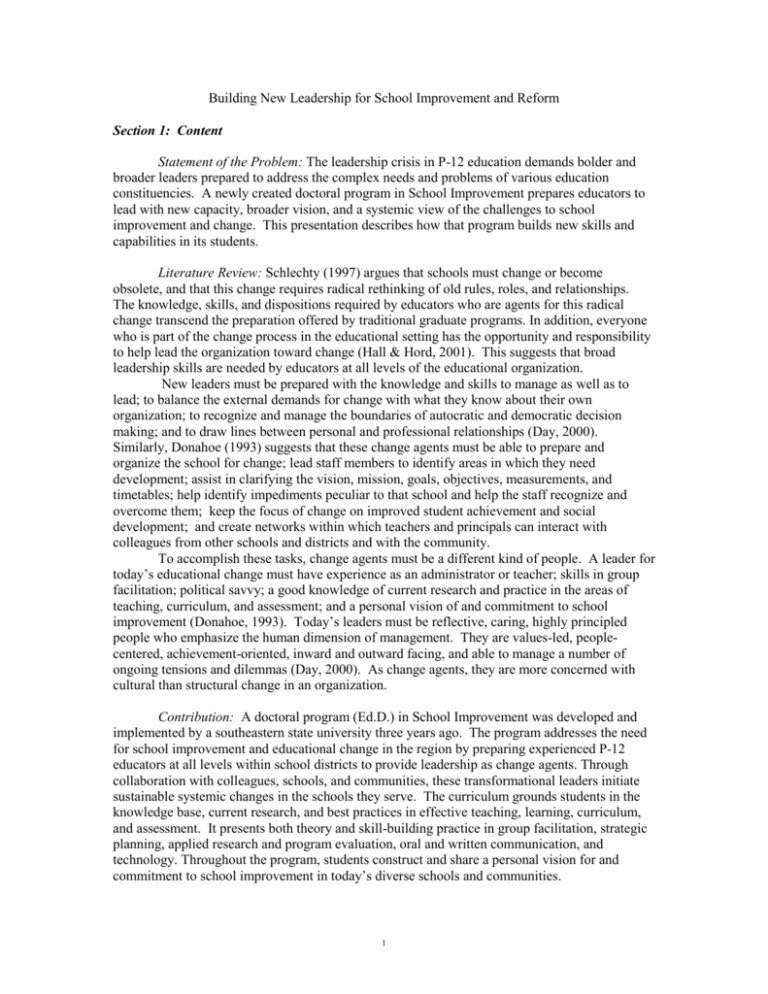
Building New Leadership for School Improvement and Reform Section 1: Content Statement of the Problem: The leadership crisis in P-12 education demands bolder and broader leaders prepared to address the complex needs and problems of various education constituencies. A newly created doctoral program in School Improvement prepares educators to lead with new capacity, broader vision, and a systemic view of the challenges to school improvement and change. This presentation describes how that program builds new skills and capabilities in its students. Literature Review: Schlechty (1997) argues that schools must change or become obsolete, and that this change requires radical rethinking of old rules, roles, and relationships. The knowledge, skills, and dispositions required by educators who are agents for this radical change transcend the preparation offered by traditional graduate programs. In addition, everyone who is part of the change process in the educational setting has the opportunity and responsibility to help lead the organization toward change (Hall & Hord, 2001). This suggests that broad leadership skills are needed by educators at all levels of the educational organization. New leaders must be prepared with the knowledge and skills to manage as well as to lead; to balance the external demands for change with what they know about their own organization; to recognize and manage the boundaries of autocratic and democratic decision making; and to draw lines between personal and professional relationships (Day, 2000). Similarly, Donahoe (1993) suggests that these change agents must be able to prepare and organize the school for change; lead staff members to identify areas in which they need development; assist in clarifying the vision, mission, goals, objectives, measurements, and timetables; help identify impediments peculiar to that school and help the staff recognize and overcome them; keep the focus of change on improved student achievement and social development; and create networks within which teachers and principals can interact with colleagues from other schools and districts and with the community. To accomplish these tasks, change agents must be a different kind of people. A leader for today’s educational change must have experience as an administrator or teacher; skills in group facilitation; political savvy; a good knowledge of current research and practice in the areas of teaching, curriculum, and assessment; and a personal vision of and commitment to school improvement (Donahoe, 1993). Today’s leaders must be reflective, caring, highly principled people who emphasize the human dimension of management. They are values-led, peoplecentered, achievement-oriented, inward and outward facing, and able to manage a number of ongoing tensions and dilemmas (Day, 2000). As change agents, they are more concerned with cultural than structural change in an organization. Contribution: A doctoral program (Ed.D.) in School Improvement was developed and implemented by a southeastern state university three years ago. The program addresses the need for school improvement and educational change in the region by preparing experienced P-12 educators at all levels within school districts to provide leadership as change agents. Through collaboration with colleagues, schools, and communities, these transformational leaders initiate sustainable systemic changes in the schools they serve. The curriculum grounds students in the knowledge base, current research, and best practices in effective teaching, learning, curriculum, and assessment. It presents both theory and skill-building practice in group facilitation, strategic planning, applied research and program evaluation, oral and written communication, and technology. Throughout the program, students construct and share a personal vision for and commitment to school improvement in today’s diverse schools and communities. 1 To accomplish this, the curriculum is organized around six strands or Core Competencies: 1. School Improvement - moving schools and stakeholders in directions that enhance student learning and social development and ultimately benefit society; 2. Leadership - influencing others toward a shared commitment to a common purpose; 3. Teaching and Learning - understanding and using the knowledge base on effective teaching and learning to initiate teacher development and school improvement; 4. Research and the Effective Use of Data – understanding, conducting, and applying impactful research in school improvement and reform; 5. Scholarly Persuasion - engaging in rational discussion informed by and grounded in the knowledge base and research in education and school improvement; and 6. Technology – developing sound technological literacy that impacts professional competence and school improvement. For each strand, specific and measurable objectives in knowledge, skills, and values/dispositions are articulated. These are woven throughout the coursework, which is integrated across disciplines and delivered utilizing cooperative teaching, team teaching, flexible scheduling, and on-line courses as well as traditional methods. The program is interdisciplinary, involving faculty with expertise related to school improvement from throughout the College of Education and across the university. Because of the applied nature of the program, a traditional comprehensive examination was deemed too limited to assess the range of skills and dispositions required by the program. Students are admitted to candidacy for the degree after successfully completing a professional portfolio similar to the National Board for Professional Teaching Standards (NBPTS) portfolio. Each of the five integrated entries requires students to provide evidence that they have achieved and are practicing specific Core Competencies. A reflection paper interprets the artifacts for each entry with respect to the program standards and competencies. Students design and complete a dissertation in school improvement as a final requirement for the degree. Information about this innovative doctoral program in School Improvement contributes to our future thinking about the profession by providing a model of graduate education which addresses the need for more skilled, broadly-based leadership throughout P-12 institutions. It provides thinking and discussion about curriculum, delivery, and assessment of graduate education focused in improving schools from within. Conclusions: Program evaluation and revision are ongoing in this newly implemented program. From our experience thus far, we have gained insights regarding the challenge of preparing new leaders for educational change in a traditional university setting. 1) Recruitment and selection of students into the program are critical. As Day (2000) noted, transformational leaders are a different kind of person. Admissions criteria and procedures must identify educators who have the personal qualities and commitment to become transformational leaders in all levels of today’s schools. Traditional graduate school criteria are not enough. 2) Recruitment and selection of faculty members to work with the program are also critical. The collaborative delivery of the program gives rise to academic freedom issues, and some faculty use this as a justification to avoid the true interdisciplinary, integrated approach which the program requires to build bold, new leaders. 3) Organizational structure needs modification. While the degree was established as a university-wide, interdisciplinary program which transcends traditional barriers within the institution, it is challenged by traditional structure issues (promotion and tenure, FTE, etc.). A new vision of graduate education and the roles and responsibilities of graduate faculty must become part of the institutional culture. 2 4) Cultural change is needed. In order to deliver a collaborative program, a Culture of Commitment to the mission and vision of the program is needed rather than a culture characterized by compliance to the expectations of authority. Schlechty (1997) points out the need for this radical rethinking of rules and relationships as central to educational change. 5) Relatedly, we note that the personnel, structural, and cultural issues which challenge the development and implementation of this doctoral program are the same challenges and barriers that the program’s graduates will encounter as they provide leadership for change in their P-12 settings. In our higher education setting, we must be the agents for change and transformational leaders that we’re preparing our graduates to be. Section II: Outcomes and Methods Learner/participant Outcomes: As a result of this directive session, participants will understand the mission statement, vision, curriculum, and assessments of an innovative doctoral program that prepares new, bolder transformational leaders for change in today’s complex educational communities. They will reflect on the challenges encountered in establishing such a program in a traditional higher education setting, and be led to similarly reflect on their own setting for educational change. Methods: This content-oriented presentation is best delivered as an individual paper. In addition to a formal paper provided for each participant, graphics (overhead transparency or Power Point) will supplement the oral delivery. Time for questions and discussion will be provided after the presentation. Participants will also be available after the presentation and the conference for discussion and consultation. References Day, C. (2000). Beyond transformational leadership. Educational Leadership, 57(7). 56-59. Donahoe, T. (1993). Finding the way: Structure, time, and culture in school improvement. Phi Delta Kappan,75, 298-305. Hall, G. E. & Hord, S. M. (2001). Implementing change: Patterns, principles, and potholes. Boston: Allyn & Bacon. Schlechty, P. C. (1997). Inventing better schools: An action plan for educational reform. San Francisco: Jossey-Bass. 3
